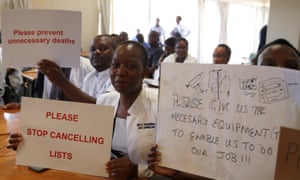Senior doctors go on strike as president is warned that lack of medicine could lead to collapse of emergency services

A doctors’ strike in Zimbabwe entered its second day on Wednesday with health workers claiming patients in the biggest state hospital are dying due to a lack of drugs and medical supplies.
Dozens of doctors picketed outside Parirenyatwa hospital demanding improvements and claiming government promises to improve the health service had come to nothing.
“I am just seeing patients, making a diagnosis and sending them away to die,” said gynaecological oncologist Bothwell Guzha, adding that the hospital had no cancer drugs left.
In an open letter to the government of President Emmerson Mnangagwa, they said they were only able to treat emergency cases. “The currently available resources might not be able to sustain the emergency service provision beyond the end of the month,” said the signatories.
Zimbabwe’s once vibrant health delivery system has collapsed in the past two decades, largely due to an economic crisis. Lack of medicines and equipment has encouraged health workers to leave the country for jobs abroad. Wealthier citizens and politicians openly travel to neighbouring South Africa for medical treatment.
The country is acutely short of dollars, the currency it has used since 2009, causing price spikes and shortages of basic goods, medicines and fuel.
Plans to float a new transitional currency introduced last month have been delayed.
In a meeting with the health minister, Obadiah Moyo, the doctors described shortages of painkillers and syringes and said nurses had to wash and reuse bandages, increasing the risk of infection.
Azza Mashumba said the theatre in the maternity unit she heads had not been working for some time, forcing doctors to delay caesarean operations, sometimes with fatal results.
“I come to work to certify dead (baby) bodies, that’s not why I am here … We are not working, we are not helping patients,” she told the health minister.
Last year, junior doctors held a 40-day strike for better pay and conditions that crippled Zimbabwe’s public hospitals. The government sacked 550 medical staff on Christmas Eve over the stoppages. This week it was the turn of senior doctors to walk out, saying the new government had not fulfilled promises it made following the previous action.
“We feel that these compounding factors have compromised patient care, putting patients’ health and lives at risk at the very institution which is supposed to restore health and life,” the doctors said. “We have tried to make adjustments, to no avail.
“Statistics show that for January and February this year, we have operated less than 20% of the elective cases that we were doing in the same period in 2018.
Patients with simple conditions like appendicitis and diabetic foot ulcers were going for days without antibiotics, leading to complications, the doctors said.
COMMENTS
There is only one solution. Get RID of ZANU PF
Perhaps the ZANU-PF government has decided that those critically ill aren’t going to be contributing to the ministers’ paycheques, so why spend the money on medical care. Murder by a different name.